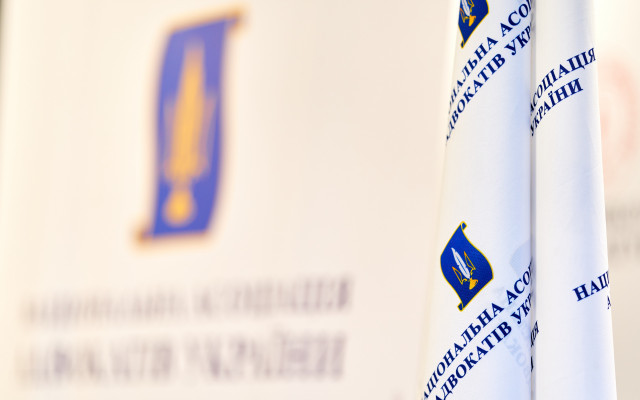
BCU initiates resolution of the issue of visits by advocates to convicted persons

Article 110 of the Criminal Enforcement Code guarantees convicted persons confidentiality of meetings with their advocate. One of the important elements is the possibility to communicate with an advocate in a room without a solid partition. In practice, this provision of the law is systematically violated.
The existing problem was examined by the Bar Council of Ukraine during its meeting on May 6.
The reason for the meeting was an appeal by advocate Yevgenia Shara, who reported that on April 17, on behalf of the Northern Interregional Center for the Provision of Free Legal Aid, she arrived at Zhytomyr Penal Colony No. 4 to conduct a confidential meeting with a convict.
She provided all the necessary documents, including a copy of the power of attorney and her lawyer's certificate, and requested in writing that the meeting be held without a partition.
After passing through the checkpoint and waiting at the facility, the advocate was informed that the meeting could only take place through glass in the presence of other persons. Alternatively, she was offered to conduct the visit without glass, but (for her own safety) subject to a personal search by a female employee of the facility. The woman refused to be searched, citing her professional status and the absence of grounds for such actions, in particular due to her compliance with the dress code and the open contents of her document folder. In response, E. Shari was informed that refusal to be searched would make it impossible to meet with the convicted person in confidence.
As a result, she was unable to conduct the planned communication and sign the necessary documents with her client.
The advocate is convinced that the refusal to grant a confidential meeting and the requirement for a personal search violate her professional rights, impede the exercise of her advocacy and do not ensure the preservation of attorney-client privilege.
She also pointed out that the facility does not have a specially equipped room for confidential meetings between advocates and their clients, and in most cases, visits are conducted through glass. Therefore, such violations are systematic. At the same time, there are no effective mechanisms to protect the rights of advocates while performing their professional duties in penal institutions.
Oksana Kadenko, Chairman of the UNBA Committee on Free Legal Aid and member of the BCU, drew attention to the fact that in penitentiary institutions, advocates are considered «sources of increased danger» and are subject to additional measures.
She explained that in order to meet the quality standards for the provision of free legal aid, the advocate must sign certain documents with the client, in particular, a protocol of agreement containing attorney-client privilege. When the meeting takes place through glass, the documents are handed over by a prison officer, who checks their content and decides whether to give them to the prisoner.
«The advocate tried to explain, refer to the provisions of the law, and initiate their application to ensure a confidential meeting... without a partition, without an earpiece, with the possibility of handing over documents to the client, directly receiving information and passing it on, but she was refused», - O. Kadenko commented on the situation. Referring to her own experience, she noted that in penal institutions, advocates are indeed sent to rooms equipped with a partition wall, and visits take place in the presence of an employee of the institution.
The BCU member explained the essence of the applicant's position: there are two subsystems under the Ministry of Justice: the penitentiary and the free legal aid. An advocate who has been instructed to provide legal aid is in a vulnerable position in a penal institution. At the same time, the ministry, which has the ability to resolve the problem, does not synchronize the work of these two systems.
Since the problem concerns all advocates, O. Kadenko proposed to make the case of Y. Shara a model case and to organize an open roundtable event on the platform of the Ukrainian National Bar Association with the participation of representatives of the Ministry of Justice and the Parliamentary Commissioner for Human Rights.
«I am confident that this institution will partner with us in resolving these issues, because violations of the right to confidential visits and the lack of mechanisms for the proper implementation of the rights of convicts to access legal aid are not only our issue, but first and foremost the issue of the Human Rights Commissioner, - said the BCU member. - By joining forces, we will be able to achieve real results and change the legal practice, which is necessary for both advocates and convicts».
The members of the Bar Council of Ukraine voted unanimously in favor of this decision.
© 2025 Unba.org.ua Всі права захищені
"Національна Асоціація Адвокатів України". Передрук та інше використання матеріалів, що розміщені на даному веб-сайті дозволяється за умови посилання на джерело. Інтернет-видання та засоби масової інформації можуть використовувати матеріали сайту, розміщувати відео з офіційного веб-сайту Національної Асоціації Адвокатів України на власних веб-сторінках, за умови гіперпосилання на офіційний веб-сайт Національної Асоціації Адвокатів України. Заборонено передрук та використання матеріалів, у яких міститься посилання на інші інтернет-видання та засоби масової інформації. Матеріали позначені міткою "Реклама", публікуються на правах реклами.